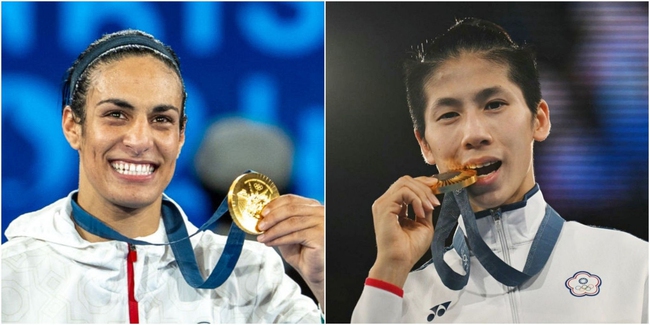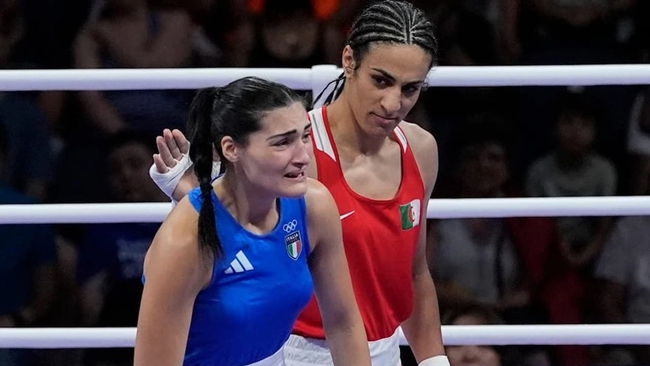Imane Khelif and Lin Yu Ting both won boxing gold at Paris 2024 amid a global outcry over whether they were eligible to compete in the women’s weight class.
Last year, both Khelif and Lin were disqualified from the world championships by the International Boxing Association (IBA) after blood tests showed they both had XY chromosomes. The IBA said blood tests on the two fighters were conducted in May 2022 and March 2023, with the results “clearly indicating” that they “did not meet the eligibility criteria for IBA women’s events”. Lin did not appeal, while Khelif took the case to the Court of Arbitration for Sport (CAS), but later withdrew his appeal.
Despite being informed of the IBA’s testing results last year, the International Olympic Committee (IOC) has always recognized Khelif and Lin as female athletes, asserting that because they were born and raised as women, and are registered as women in their passports, they are eligible to compete in the women’s weight class under their rules.
Some argue that being registered does not prove gender. But the IOC has also questioned the accuracy and timing of IBA testing, pointing out that boxers have been competing for years without being tested.
At the closing ceremony last Sunday, the boxers were again in the spotlight as flag bearers for their countries – Khelif for Algeria and Lin for Chinese Taiwan. But the end of the Games does not mean the end of the issue, with boxing facing some key questions…
Will Olympic Boxing Change Rules?
In 2021, the IOC issued new guidelines requiring sports federations to develop their own eligibility policies, rather than requiring a blanket policy based on testosterone levels. Several sports federations have toughened their gender eligibility rules in recent years, banning transgender women from top women’s competitions and requiring athletes with differences of sex development (DSDs) to medically reduce their testosterone levels.
The IOC’s eligibility rules for boxing have therefore fallen short of those of other sports. The IOC abandoned genetic sex testing in 1999 and appears to be resistant to changing the rules, partly out of fear of stigmatisation. “It’s not as easy as some people might want to portray it – that XX or XY is a clear distinction between male and female. That’s not scientifically correct anymore,” IOC President Thomas Bach said, but added that “If someone presents us with a solid scientific system – how to define male and female – we will be the first to do it.”
Imane Khelif and Lin Yu Ting’s ability to participate in non-Olympic tournaments remains uncertain
“There are many women who have higher testosterone levels than men,” an IOC spokesman said. “The IOC is always trying to balance tolerance and fairness, more broadly, safety. It’s a difficult issue.” Opponents say achieving such a balance is impossible.
The boxing controversy has prompted calls for mandatory sex testing at future Olympics, with a return to the swab test (which the IOC abandoned in 2000). They say the majority of female athletes support this. However, others argue that more comprehensive testing is needed to be sure of an individual’s genetics. But this would raise concerns about the cost.
After the Olympics, what tournaments can Khelif and Lin participate in?
The IBA will be the de facto world governing body for amateur boxing. Last year’s ruling meant Lin and Khelif would not be able to compete in their events. But with several countries boycotting IBA events, there is pressure for boxing to form a new governing body. World Boxing was launched in 2023 and currently has 37 members, but that’s still far fewer than the IBA, and it’s not recognised by the IOC.
We don’t know if Khelif and Lin are athletes with DSD as the full results of the tests are confidential and the fighters have not yet released them. They and their promoters have maintained that they are female. However, what the IBA has said has led to speculation that the two fighters could be athletes with DSD.
Caster Semenya – who was born with a DSD ratio of 46 XY 5-ARD – has won two Olympic 800m gold medals in the past. At Rio 2016, all three medalists in the women’s 800m were DSD athletes, including winner Semenya.
Several top sprinters have also been affected by the sport’s restrictions on DSD athletes. Namibia’s Christine Mboma, 200m silver medallist in Tokyo, and compatriot Beatrice Masilingi, along with 11 others, have missed the 2023 Budapest World Championships under new rules requiring DSD athletes to reduce their testosterone levels for at least six months before returning to competition.
However, there is debate even within the scientific community about what physiological advantages DSD athletes actually have, depending on the type of DSD. Some argue that it is impossible to determine who has a Y chromosome as male and who does not have a Y chromosome as female, and that more data is needed.
In 2018, World Athletics said athletes with DSD would not be allowed to compete in any women’s event between 400m and 1,500m unless they had reduced their high testosterone levels with specific drugs six months before competing. It was deemed necessary “to ensure fair and meaningful competition in the women’s classification”. Semenya responded to the rule, saying it was discriminatory and a violation of her human rights. She refused to undergo treatment and has been embroiled in legal battles over the issue for years.
Angela Carini cried and asked to withdraw from the match against Imane Khelif to “save her life”
World Aquatics, which has adopted similar regulations to athletics, said all athletes “must certify their chromosomal sex with their national federation”, adding that “failure to do so, or providing a false certificate, will result in their ineligibility”.
The most divisive issue
Gender is not the only controversy at Paris 2024, but it is perhaps the biggest and most divisive issue. It dominated press conferences with IOC officials, and received a lot of coverage, especially when both Imane Khelif and Lin Yu Ting won convincingly and eventually took gold.
At its most prestigious event, the IOC has faced accusations of neglect, failure to protect women and denial of science. The turmoil has also overshadowed Bach’s final year as IOC leader before he steps down in 2025. It has also led to global, and sometimes uninformed, scrutiny of the two boxers involved, particularly on social media.
Khelif has launched a legal case against what her lawyer described as “violence against women, racism and sexism” online, claiming she has been the victim of “a digital lynching”. Meanwhile, Bach spoke of the “Olympic spirit of living life in peace, as a single human being, united in all our diversity”.
Khelif and Lin will return home as national heroes, but now they must decide what future they want in boxing, having been tested.







